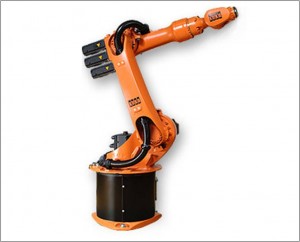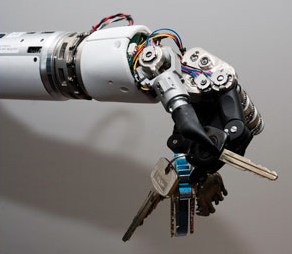or Mechatronic Engineering, humourously (but incorrectly) referred to as Megatronics at times. In Afrikaans Megatronika or Megatroniese Ingenieurswese. What is it? What can you do with it? When I started studying I didn’t know, after 5 years I think I have a vague idea. So below I’m going to post what I know.
In it’s simplest form it’s a combination of Mechanical and Electronic Engineering. If I really don’t feel like explaining, I simplify it to robotics. This is certainly a large portion of Mechatronics, but by no means a limiting factor.
Mechatronics as a named profession is fairly new, but the idea has always been there. In the South African context, UCT have had an accredited BSc (Eng) Mechatronics course since 1997 (although how long it has actually been running is uncertain), NMMU a BEng since 2007 (first graduates) and Stellenbosch since 2005 [1]. Potchefstroom University (NWU) are apparently aiming to start a course in the next few years [2]. Although not offered in the BEng format, UKZN do offer Masters through their Mechatronics and Robotic Research Group [3]. [EDIT: added list of BTech degrees and Diplomas offered at the bottom of the post]
Mechatronics at Stellenbosch [2]
I completed my BEng Mechatronics at Stellenbosch University in 2011. The Mechatronics course was presented by the Department of Mechanical and Mechatronic Engineering in a four year course. The first two years were identical to that of those studying towards a BEng Mechanical. The first year course is identical for all engineering students. In the third and fourth years, the two courses still followed similar routes, with the Mechatronics course replacing several Mechanical courses with some courses presented by the Department of Electronic and Electrical Engineering. In third year these included Electronics and Computer System’s courses and fourth year Electronics and Electronic Design Courses. Losing out on some Strength of Materials and Thermo-Fluid Mechanics.
The department put it this way [6]
The most important difference between the mechanical engineering programme and the mechatronic programme is that mechanical engineers are equipped to develop mechatronic systems with existing controllers (computers, PLC’s, etc.), while mechatronic engineers are also equipped to develop specialised controllers (e.g. for embedded controllers) and the relevant electronics themselves.
At the time, the Head of Department felt that Mechatronics as an entity was still too new. Employers weren’t advertising for Mechatronic Engineers, and didn’t really know what to do with them when they did get them. This resulted in the close ties between the Mechanical and Mechatronic courses. I was often unhappy about this, having would of preferred more focus on the Electronics, but in the end it worked out. And the HoD’s opinions were/are valid.
When I chose Mechatronics, I didn’t know where I was going to work, I chose the course because it sounded interesting. It wasn’t until my final year that I found a direction to work towards. Course setups at different universities are going to be different, and will put emphasis on different subjects, that doesn’t necessarily make one better than the other. Either way you’re going to come out of it with a degree and a fair amount of knowledge. Most importantly though (and this is true for any engineering degree) is you’ll know how to learn.
I’m quite confident that specific things that I learn in my first year of work will be of more value to my career than a specific subject at varsity, but having struggled through several subjects, I know I can figure out most things that come my way. I know where to look and how to go about solving problems.
In my final year we were a class of 85 Mechanical/Mechatronic students, of which I’d say about 30-35 received their BEng Mechatronics in 2011.
Mechatronics at NMMU [2]
NMMU have a slightly different setup. Mechatronics is presented by the Mechatronics school of the Department of Engineering, the Built Environment and IT. Mechatronics is the only Engineering degree they offer. As such, first year physics and maths are taken alongside BSc students and after the first year, courses taken are aimed only at Mechatronics students. The format of the course is still identical to that of when it started giving a good balance of subjects. The University also offers an array of BTech degrees in other Engineering fields.
I’m currently pursuing my master’s degree at NMMU. Their 4th year BEng Mechatronics class has roughly 25 students in it and the 3rd year class about 30. First year applications are limited to 60, with the most recent 1st year class starting with 50 students. The Mechatronics department is currently sponsored by General Motors South Africa (who have a plant in PE) and also have close ties to the Volkswagen plant in Uitenhage.
Mechatronics in General
Mechatronics as a career is still finding its feet. Meaning many consider it a jack of all trades, master of none type of situation, and although the course may feel that way, it’s certainly not the end of the story.
Mechatronics isn’t a new field, it’s just finally been given a name. When you tell people you’re a Mechatronic Engineer they don’t know what that is. I had a month stint at a large production facility as part of vacation training and I was asked to choose between focusing on their Mechanical or Electrical divisions, eventually settling for a bit of time at each. But that’s how businesses in SA are structured. This will change.
Several Mechatronic Engineers that I know have taken up Automation maintenance posts. Nothing wrong with this, personally it’s not where I want to be. Contrary to this though, my first job next year will be in automation maintenance. I however plan to use this as a stepping stone into a design career.
Automation is fun, and whereas I am going into automation in a production sense, automation also relates to smaller and/or more technical situations. The recent landing of the Curiosity rover on Mars is a perfect example of Mechatronic systems. There are several elements here, from the automated landing system to the remote control of the device.
In the motor industry, systems such as traction control, ABS and ESP are all examples of Mechatronic systems. Heavily complicated systems that rely on the processing of data from sensors to enable control of actuators. As such a Mechatronic Engineer can make him/herself home in many different industries. These include the Automotive, Aerospace, Manufacturing, Medical and Communications Industries.
Mechatronic Engineers can register with ECSA to become Professional Engineers [4]. The industry is governed by the South African Institute for Mechanical Engineers. I don’t see Mechatronics separating from this tree any time soon. The degree, being accredited by ECSA also means that the degree will be recognised internationally in many countries thanks to the Washington, Sydney and Dublin Accords [5]
So what do you do when you have your degree? You do whatever you want. You’ll find something. I’m not aware of any of my colleagues who are currently not pursuing a post-graduate degree or are employed. Not all of them are in Mechatronic specific posts. Some have opted for more mechanical orientated jobs, while others have gone entirely into areas such as electronic design or programming. And that’s one thing, a degree in Mechatronic Engineering in no way limits you. Very few engineering degrees will actually.
After re-reading what I’ve written, I think I’ve put forward some information relating to Mechatronic Engineering, but it’s still left fairly vague, maybe it’s just because none of us know what we’re really doing :)
A National Diploma in Mechatronics (for registration as a Professional Engineering Technician) can also be had from the following institutions [7]:
- Tshwane University of Technology
- UNISA
- Cape Peninsula University of Technology
A BTech in Mechatronics (for registration as a Professional Engineering Technologist) from [8]:
- Tshwane University of Technology
- UNISA
- Cape Peninsula University of Technology
and to reiterate, a BEng, or BScEng (for registration as a Professional Engineer) [1]:
- Stellenbosch University
- University of Cape Town
- Nelson Mandela Metropolitan University
Note: Although other institutions may offer courses in Mechatronics, or Mechanical Engineering with a focus on Mechatronic elements, the ones listed above are the only ones recognised by ECSA for registration as a mechatronic professional. Information was correct at time of posting, but may have changed since.
There are also several Universities of Technology and FET Colleges which offer courses in Mechatronics. CPUT is one of these institutions. Another training institution is Umbilo Training Specialists in Durban. They are running a free training course, once a month where anyone can come to learn more and expand their knowledge. Checkout their page for details.
For some more reading and a very complimentary view with some poignant remarks have a read here.
As part of my degree at Stellenbosch University I completed a project which can be seen here.
As part of my master’s degree at NMMU I completed a project which can be seen here and here.
If you’re looking for bursaries, try this website.
If you have any questions, feel free to ask in the comments section.
- [1] ECSA – Accredited Universities
- [2] Much of what is stated comes from my own experiences and conversations with relevant people.
- [3] UKZN – Mechatronics and Robotics
- [4] ECSA – Registration
- [5] ECSA – Recognised Qualifications
- [6] Stellenbosch University – Mechatronic Engineering
- [7] ECSA – Accredited Diplomas
- [8] ECSA – Accredited BTech





hi Gareth
first i’d like to thank you for giving this helping information about mechatronic engineering.
i’m currently doing third year at the university of pretoria in beng(mechanical engineering), and they only allow you to choose the fields you want to specialise on, on your final year it either you do (mechanical or aeronuetical engineering) and they do offer a few mechatronics modules in mechanical field.
My question is, is it true that a BEng engineering degree is equivalent to (BSc degree + BSc honours engineering degree?)
my be that the reason why one of the comments mentioned that stellenbosch degree is way better than that of NMMU.
Hey Mhlengi, glad to help
All engineering degrees in South Africa (Either a BEng, or BScEng) that are accredited with ECSA are NQF 8 qualifications, this is equivalent to a 3 year general BSc degree (NQF 7) with honours (NQF 8). This is why all engineering degrees in SA are 4 year degrees and why you go straight into masters (NQF 9) without the opportunity to do an honours (it’s basically included).
So yes it is true that a BEng degree is equivalent to a BSc Honours degree.
The NQF is the National Qualifications Framework (www.nqf.org.za/) which tries to give a way of relating qualifications from different fields, different structures. From this point of view there is no difference between the 4 year BEng degree at Stellenbosch and the 4 year BEng degree at NMMU.
Hope this answers your question.
Hi Gareth, thanks for all the info!
I just enrolled my son at Central Technical College in Durban for a course in mechanical engineering with a N6 qualification. On completion of his N6…will he be
able to study mechatronics at university?
Thanks! Usha
Hi Usha
Entry requirements differ from university to university, but a ‘senior’ student, who has completed a course in a relevant area previously, or who has worked in industry for a few years definitely has a good chance of getting in for a Mechatronics course.
All the best.
Gareth
Hi Gareth. WOW – your blog has certainly drawn great interest and interaction. Congratulations! It’s very obviously helping those out there with questions on Mechatronics.
My son has just started his final year of Mechatronic Engineering at Stellenbosch, and I was impressed to see that you had received a bursary in your final year of study. We are desperate to find a bursary for his final year, as I’m a single mom.
Any idea of what companies to approach???
He’s done a lot of vac work at a motor manufacturer over the years, but their applications unfortunately closed in October last year and at the time we were unaware that we’d be needing a bursary.
So any suggestions of who we can approach at this stage for a final year bursary, would be GREATLY appreciated!
Thanks Gareth.
Kind regards,
Hi Cheryl
The bursary I applied for also closed applications in October the previous year although I was only granted the bursary in my final year. Unfortunately all the bursaries I’m aware of have closing dates that are generally early in the preceding year. I’m not aware of any that you could still apply for at this stage to cover this year.
There are possibly some still available, but I’m sorry that I can’t help you.
Good Luck
Gareth
Hello Gareth
I matriculated last year and I don’t have enough APS points to go straight into mechatronics at the universities. I as thinking of first going to a college and obtaining a diploma then using that to apply to a university. Would you advise that I do this? If not what else can I do to get a BEng (Mechatronics) degree?
Hi Siya,
Can you make it into a BSc degree? This would be a better way in, after a year you can reapply for Mechatronics with better odds.
Otherwise once you complete a diploma, it will also help with an application to do a Mechatronics degree.
Regards
Gareth
Thank you very much…
Thanks – I have found this very informative. I am currently trying to decide between going to Stellenbosch or UCT to study engineering (probably mechatronics) next year. Most people have recommended Stellenbosch over UCT when it comes to engineering. Is this true in your opinion?
Hey Anja
I went to Stellenbosch and loved it there, but have never studied at UCT, so can’t say one is better than the other. I have friends who went to UCT they enjoyed it there. Very difficult to compare the courses. I think I would have preferred the actual Mechatronics course at UCT because of their greater focus on Electronics, where as Stellenbosch focuses more on the Mechanical subjects, this doesn’t mean one is better than the other.
Hi Gareth
Thank you so much for the useful information. My son is in matric this year and he wants to study Mechatronics at UCT or Stellenbosch, he is good in maths and physics. To be honest you have changed my mind because I was very sceptical about this Mechatronics , I was worried if he will be able to get a job after studying it.I was trying to convince him to study mechanical engeneering or medicine.
Hi Zinhle
Glad I could help :) Always remember, that an Engineering degree, regardless of its focus is a great thing to have, and allows one to wokr in more than one area. All the best for your son.
Hi
I passed my matric last year(2013) & i hav’nt enrol with any university as a lack of funds/bursary i want to ask if its posible to i can get admission next @ stellenbosch or NMMU with the following results
XITSONGA HL 85%, ENGLISH FAL 71%, LIFE ORIENTATION 85%, MATHEMATICS 70%, PHYSICAL SCIENCES 61%, LIFE SCIENCES 71%, AGRICULTURAL SCIENCES 66%
Hey Trinity
I’m not 100% sure, but I’d reckon you would be accepted to either university with those marks. Assuming Pure Maths, that’s a decent mark, science might be slightly low, but should be sufficient.
Good Luck
Hi Gareth,
Brilliant and helpful site thanks.
Were your courses in english or afrikaans in Stellenbosch?
Hi Charmaine, thanks
During my first and second year, all courses were offered in either English or Afrikaans. In third and fourth year it was the lecturers choice as to what to teach in. Majority chose English, but some chose Afrikaans. After a few years in Stellenbosch though this generally isn’t a problem. Text books and exams are still available in English. In my final year the university also started testing with intime translations of all Afrikaans lectures to English, I believe they are rolling this out to more and more subjects.
Hi
I’ve done mechatronics NQF level 2 in one compony, now I don’t know where to go for NQF level 3.
Please help me with componies that got the same program / collages around KZN
Hi Sizwe, I don’t think I understand what you’re looking for. Where did you get your NQF level 2? Was it specifically in Mechatronics?